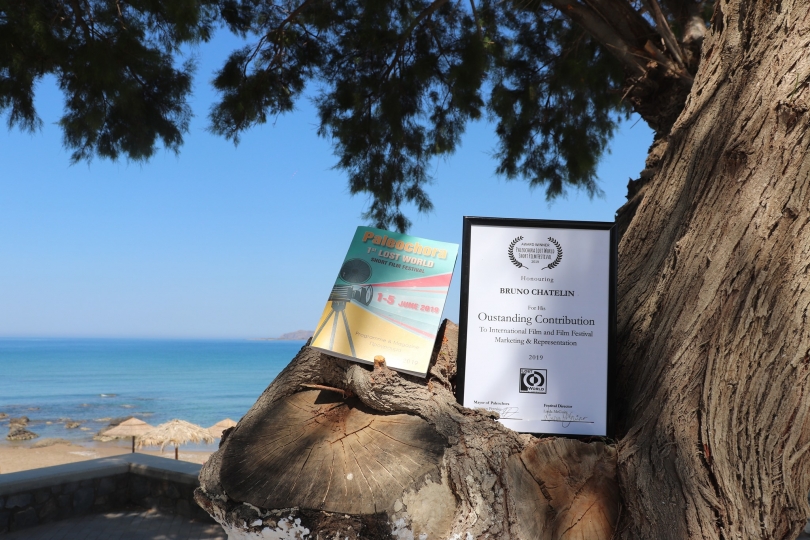Christoph Terhechte has been a member of the International Forum of New Cinema’s selection committee since 1997 and directing the Forum since 2001.The Forum is widely considered as the most innovative artistic and political section of the Berlinale featuring experimental, avant-garde films and documentaries characterized by unconventional approaches and presenting new film makers. Terhechte added in 2006 ‘forum expanded’, a new component of the Forum exploring the emerging fusion of cinema and the arts.
Claus Mueller:
There has been a constant increase in the number of productions submitted to film festivals. Has this been a problem for the Forum and how do you cope with it?
Christoph Terhechte
Of course it has become a problem. Now it takes more efforts. A couple of years ago we could screen all the films in a room together. Now we have people prescreening for us, writing reports and recommendations and than we go through a second and third stage process screening. It gets more complicated and of course you risk having a festival overlooking something.
CM That is what Dieter Kosslick [Berlinale Director] told me last year
CT It is a problem but it is not unmanageable
CM Richard Pena noted in an interview I did with him that there has been a dramatic increase in productions due to a surplus of film makers and inexpensive production technologies, but there has not been a parallel increase in the quality of productions submitted. Thus you may have 500 independent productions submitted years ago and 12 good ones and now you have 1000 and 14 good ones
CT Yes, that is correct. The number of extraordinary films does not increase whereas there has been an overall increase in the number of productions. Not only does it increase, but we also receive all these productions since it has become so easy to make DVD copies and send them to Berlin. The number of submissions to the whole festival has surpassed 5000 this year including short films of course. The availability of cheap video material has not helped in countries like the US but it has certainly made film accessible to developing countries where it was virtually impossible for film makers in rural areas or even in the cities to make films of their own. This holds for China where they have to face censorship or countries like the Philippines where you just do not have the means to shoot on 35 millimeter. But I think even today any filmmaker who is really determined who has an idea, the creative potential to make a film could make a film on 35 in the US if he would really commit to the idea. It does not mean that video is necessarily less interesting than 35, it just means that the availability of digital media has not helped the creative output in anyway.
CM Have your criteria of selections changed over the last years?
CT No. It would be difficult to fix these criteria in writing and you would contradict yourself all the time because sometimes you have films which you never would have thought to describe in the first place. Let’s take the idea of having a program which is dedicated to innovation. You cannot describe innovation because you depend on others’ ideas and if you are confronted with ideas you have not yet seen then [you] could not have described them before. So it is hard to fix criteria. We have to be open minded and we have to be a democratic group making selections. We have different personalities, different points of views and we have to convince each other of the films we are going to invite and create that program together. So the number of seven people who select the films is ideal in coming up with a very varied program.
CM Keeping what you said in mind, do you observe a change over the last few years with respect to the themes approached by film makers? In contemporary society we talk about privatization, individuals getting more and more isolated, fewer social networks, do you observe these factors in the productions?
CT There are certain changes every year or over the years, but I would not say that film making has become less or more political. It is just that certain issues are treated in one year and other issue in another year and we try to reflect that in our program. This year we have several films in which children are the protagonists, not films for children, but films which express their ideas through children. We have several films that deal with history and memory. These seem to be subjects that somehow come up at a certain point, being treated not only in film but also in other media and then may be left behind again. That is just the normal flow.
CM How many productions were submitted this year?
CT To the forum alone about 2000 this year.
CM How many did you select?
CT 36 for the main program and some other screenings
CM If you look at all these productions and those you selected, is there some sort of
common denominator in your selections? Put differently if someone wants make a film for the Forum and asks for advice what would you say?
CT Well, one guide line, but it is only a basic one, and I am sure that certain films in our program don’t even reflect it, is that if you want to make a fiction film, make it look like a documentary. If you make a documentary have a strong narrative so that it looks
like fiction or feels like fiction. I think that the overlap of both is very important. A fiction film that is truly artificial and has nothing to do with reality is in most cases quite boring.
A documentary that uses the traditional form of a documentary, explains everything you see, and has no narrative to drive the story may be interesting but is usually not and not included in our program because we like films that are not easily identified as either.
I don’t really believe in the distinction between the two. [For example] take any of the
strong American independents of the recent years, or this year’s BALLAST [Lance Hammer, dir.] which is in competition and is a great film. I would have loved to have [this film] in the Forum and am happy that it has gone to competition or take LOBSTER SHOT GUN STORY or the films by David Gordon Green, all these fiction films show a lot of American reality today. These are the films which to me are the highlights of American independent cinema in recent years.
CM Do you have more political films this year and do they present a reflexive cinema as distinct from just being consumed?
CT I do not think that we are showing more political films than we used to we just talk more about them. This is good since you should not hide your politics behind art and politics has always been an important part of the Berlin festival in different ways since the fifties. The programs before Kosslick have included as many political films though they many have failed to communicate the idea as well as Kosslick does.
CM Does the reflexive cinema have an impact?
CT Absolutely
CM Above and beyond learning something?
CT Learning is certainly the first step of course. You need to see in order to learn and you cannot expect people to read the papers from the first to the last page each morning. It is much more gratifying to learn though cinema and to feel and see how people live in other countries. I think by seeing all the films from so many different places you become much more open minded. That is the first step. The next step, that is what you will do, is something that the cinema cannot tell you. It cannot tell you to go to Calcutta and treat the poor or take the gun and shoot the rich. It is not something cinema could or should do.
CM Does selection for the Forum have an impact on distribution?
CT Yes it does indeed. First of all we work closely with world distribution, that is sales agencies, even before the forum begins we advise them about our selections
and ask them to have a look at the film and take on certain films. SON OF A LION has been bought by Fortissimo films after we selected it. White Management in Paris has bought four Forum titles. There are others that have been picked up before the festival or during the first days and I am sure there will be more sales. Usually, when a film is selected by the Forum it gets a lot more attention than if it were just one in ten thousand films. For those films that do not have distribution in Germany we try to find a way, talking with local distributors, arranging for screenings, promote the films, keep several prints of the film in our archives and make them available, and try to circulate them in Germany afterwards. So the festival is all about giving these films a life not only during these ten days of the festival but also afterwards
CM You emphasized in one of our earlier interviews that you really do not have a preconceived notion about how to thematically program each forum. The guiding theme,
if there is one, arises out of the screening process. Thus the question is when reviewing all the submissions were there any surprises, discoveries you did no expect?
CT One thing I certainly had not seen before is what we programmed around the UNITED RED ARMY by Wakamatsu Koji. First of all I did not know much about the young Japanese terrorist groups I knew that they had attacked the air port of Tel Aviv in 1972 I knew about some other bombing later but I had no idea about the context, the students movement in Japan, and all of this comes to life in this film that poses a lot of questions. Koji emphasizes here that the red army factions that arose in Japan, Italy and Germany, that these countries have been fascist. It always goes back to the question of fascism. That is something also reflected in YASUYKUNI, the film by Li Ying who is threatened by right wing radicals in Japan, in INVISIBLE CITY by Bei Wang Lu from Singapore who tries to save the memory of the City’s history in a time of rapid changes and in the Korean film GRANDMOTHER’S FLOWERS by director Mun Jeong-hyun. He asks questions in his own family and discovers the whole tragedy of Korea is rooted in Japan’s colonial times and that everything goes back to these colonial times. And it comes back to Japan through the few left wing activists who emigrate to Japan. They are oppressed in the South in the fifties and sixties and are being discriminated there and send their children to Pyongyang [North Korea], a terrible mistake since they never came back and some lost contact. That part of Asian history is a center point in this year’s Forum, something I knew very little about and I am happy to communicate what I learned to our audiences.
CM What was the biggest problem you faced organizing this year’s Forum?
CT I am almost tempted to say this year was a year without many problems, some here and there but no major problem
CM Do you plan any changes for next year?
CT No we have reduced the number of films again, just a little. not significantly
CM Your decision rather than Kosslick’s?
CT Absolutely my decision, we want to work on every single film and do the best. You cannot do that if you have a vast amount of films… we are trying to keep it small.
CM Let me ask you a question about Forum Expanded . First, what prompted the idea of adding this really fascinating section and second, pushing the envelope further, do you plan to expand that section?
CT Well if we expand it further it should become its own section of the festival since we cannot handle it within our means. Of course there are two ideas behind creating Forum Expanded. One is to find the future of cinema. Festivals should not just continue their conservative way of doing things but also explore what other possibilities
there are, such as with mobile devices, on-line platforms, etc everything is tied to. The
other thing is that we advise them about our selections and ask them to have a look at the film and take on certain films. There has been a trend for a few years now of
filmmakers going towards art and artists incorporating film. I think it is the task of a film festival to reflect that as well. These are the reasons for Forum Expanded.
CM My last question. We talked about changes in themes. In your ten years working
with the forum do you observe any changes in the audience?
CT That is a good question and probably hard to answer. There is still a very mixed audience, young and older people together, very heterogeneous, May be a change in the behavior, there is less communication. The audience is less and less prone to discuss with a lot of passion. It is becoming more passive
CM Why is that?
CT I cannot answer, that requires a sociological study.
Claus Mueller
New York Correspondent
filmexchange@gmail.com

 Chatelin Bruno
Chatelin Bruno 




























